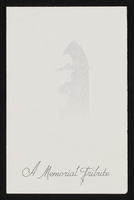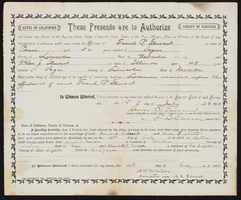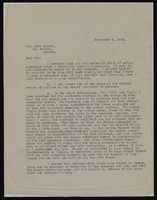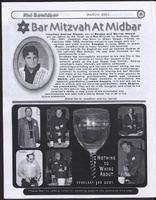Search the Special Collections and Archives Portal
Search Results

Mabel Hoggard: family materials
Date
Archival Collection
Description
Folder of materials from the Mabel Hoggard Papers (MS-00565) -- Personal papers file. This folder contains obituaries, newspaper clippings, cards, and programs.
Mixed Content

Transcript of interview with Jackie Abell by Robert Stuart, April 03, 1976
Date
Archival Collection
Description
Text
Temple Beth Sholom Records
Identifier
Abstract
The records of Temple Beth Sholom date from 1945 to 2015 and include scrapbooks, photographs, bulletins, meeting minutes, by-laws, correspondence, and publications. The collection contains documentation of the Board of Directors, the Sisterhood, the Men's Club, the history of the congregation, events held by the temple, and construction of the temple building in Summerlin in Las Vegas, Nevada.
Archival Collection

Juliana Urtubey oral history interview: transcript
Date
Archival Collection
Description
Oral history interview with Juliana Urtubey conducted by Nathalie Martinez and Barbara Tabach on May 24, 2021 for the Latinx Voices of Southern Nevada Oral History Project. Born in Colombia, Julia was able to immigrate with her family to the United States when she was six years old. The family lived in Chicago, Illinois and later in Phoenix, Arizona. Juliana moved to Las Vegas in 2013 and taught learners with special education needs at the elementary level. In 2021, she was named the National Teacher of the Year, the first Latina and the only Nevadan to ever hold the distinction. Juliana personally received the award from Dr. Jill Biden. Subjects discussed include: Colombia, Chicago, Illinois, National Teacher of the Year, and bilingual education.
Text

Dr. Linda K. Miller oral history interview: transcript
Date
Archival Collection
Description
Oral history interview with Dr. Linda K. Miller conducted by Claytee D. White on July 10, 2019 for Boyer Early Las Vegas Oral History Project. In this interview, Dr. Miller discusses her early life in Kansas City, Kansas and arriving to Las Vegas, Nevada in 2002. She talks about Helen J. Stewart, the Old Mormon Fort, and the significance of that area. Later, Dr. Miller explains the importance of teaching local history to people in Las Vegas. Lastly, Dr. Miller discusses the process of writing a book about Helen J. Stewart.
Text

Marriage certificate of Helen and Frank Stewart and Tiza Stewart land patents
Date
Archival Collection
Description
Marriage certificate of Helen and Frank Stewart and Tiza Stewart land patents
Text

Jean Munson oral history interview: transcript
Date
Archival Collection
Description
Oral history interview with Jean Munson conducted by Vanessa Concepcion, Cecilia Winchell, and Stefani Evans on November 30, 2021 for Reflections: The Las Vegas Asian American and Pacific Islander Oral History Project. Jean discusses her childhood growing up in Guam, the nursing career path of her parents, and her decision to pursue an "unconventional path" as a comic book artist. She talks about her education at the University of Nevada, Las Vegas, her passion for the Asian American Pacific Islander (AAPI) community within Las Vegas, and her roles in community activism and leadership. Jean also shares her current pursuits as a podcaster of Bruha Baddies, co-owner and printer of Plot Twist Publishing, and co-founder of the Comic and Zines Festival.
Text

Sook-ja Kim, February 12, 1996 and April 6, 1996: transcript
Date
Archival Collection
Description
The Kim Sisters, composed of three sisters, Sook-ja, Ai-ja, and Mia, came from Korea to Las Vegas in February 1959. Their first contract in America was to perform at the Thunderbird Hotel for four weeks as part of the China Doll Revue, the main showroom program. This engagement led to a successful career. Their popularity reached was at its height at the end of the 1960s when they performed throughout the United States and Europe. Sook-ja Kim is the oldest of the sisters. After his sister Ai-ja died in 1987, Sook-ja teamed up with her two brothers and continued to perform until 1989. Now semi-retired from show business, with occasional performances in Korea, she is working as a real estate agent. In this interview, she talked about her childhood, her career, and the family she has built since coming to America. Sook-ja was born in 1941 in Seoul, Korea as the third child of seven in a musical family. Her father was a conductor and her mother, a popular singer. After the Korean War, her mother arranged to send the Kim Sisters to America. When they came to Las Vegas, there were virtually no Koreans in the area. They depended on each other to take care of themselves. Some of the difficulties they had to adjust to in American were language, food, and cultural differences. Over the span of almost forty years in America, Sook-ja became acculturated without discarding her ethnic identity of family priorities. Her life-long guiding principle has been to adopt certain American values while continuing to keep her cherished Korean ethnic values. Through their performances, the Kim Sister informed the audience about Koreans and their culture. As the oldest of the group, Sook-ja was entrusted the care of her sisters, and later her brothers, the Kim brothers. Once she settled in Las Vegas, she brought more than forty members of her extended family to the city, contributing to the growth of the Las Vegas Korean community.
Text

Correspondence, Thomas Toland to Levi Syphus
Date
Archival Collection
Description
Text

